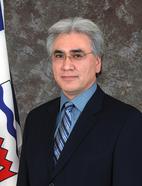Thank you, Mr. Speaker. In July 2009 the Northern Leaders’ Forum was created as a means for all leaders in the NWT to work collectively to advance the interest of our territory and its residents.
We set ourselves a task of developing a common vision and road map for the future of the NWT with input from northern residents, industry, NGOs, and youth. We accomplished what we set out to do, concluding the initiative with the release and tabling of the report in May entitled “Forging the Future - Anchored in our Past, Building on our Present.”
One of the most rewarding experiences throughout this process was the engagement of people from various walks of life, especially our youth. It was inspiring to hear about their hopes and dreams, their commitment to this place we call home, and their willingness to participate as citizens to make things better in all our communities.
Mr. Speaker, I am pleased to advise that I recently had the pleasure and privilege of hosting, along with Minister Robert C. McLeod, the Forging the Future Youth Conference here in Yellowknife.
In total, 42 youth delegates from all regions and backgrounds came together in Yellowknife on July 7th and 8th . Their task was very specific and
intended to build on progress made so far, which had been captured in the previously tabled Northern Leaders’ Forum report. Guided by the vision statement and the youth wish list contained in that report, youth were asked to develop two priorities in support of the overall vision.
I am proud to say that the attending youth were very focussed and targeted in their efforts. They worked cooperatively and diligently over the course of the two days. They talked openly about their
hopes for our people, our territory and our future, and agreed on two specific recommendations.
Their first recommendation stresses the need for people to be healthy and addiction free, a prerequisite for unlocking a bright future and taking advantage of all the opportunities that are available.
Attending youth were troubled by the high rates of addiction and the perceived lack of treatment facilities in all regions. The recommendation speaks to the need to conduct consultations for regional treatment centres to hear how best to put in place treatment centres with culturally sensitive and multicultural staff. This would lead to the development of unique treatment and recovery support plans for youth, adults, and elders.
Their second recommendation speaks to the importance of youth assigned to school counsellors, and mentors providing support and assistance to students throughout high school. The recommendation is to place a qualified youth counsellor/mentor in every school who would be well versed in cultural traditions as well as modern education and would focus on supporting student/teacher partnerships.
In addition to providing these recommendations, youth delegates also discussed the importance of enhanced youth participation in political discussions and decision-making. Delegates provided insightful and concrete suggestions, including their key proposal for the creation of a territorial youth council that is run by youth for youth communicating regularly with leaders of the government.
Mr. Speaker, in order to realize the vision and goals contained in Forging the Future, we must translate ideals into action. This task rests with each and every one of us - leaders, government workers, business people, community volunteers, parents and youth. We must all be part of the solution.
Mr. Speaker, later today I will be tabling the summary of the Forging the Future Youth Conference which will provide more information about the discussions that took place at the conference, and I would encourage all Members, present and future, to read the report and listen to what youth have said about the Northwest Territories and their expectations of what should
happen in order to reach our full potential as a people and territory. Thank you, Mr. Speaker.
